This discussion and review contains spoilers for House of the Dragon episode 9, “The Green Council,” on HBO.
The more interesting aspects of House of the Dragon derive from the ways in which it differs from Game of Thrones. To put it simply, House of the Dragon has a much tighter focus. The show is concentrated within Westeros’ hermetically sealed corridors of power and has avoided scattering its cast over vast distances. When a character like Corlys Velaryon (Steve Toussaint) wanders too far from the show’s center, the show simply stops cutting to him.
“The Green Council” is an episode built around these core strengths, even going so far as to double down on them. While Game of Thrones would cut between a vast ensemble who were dotted across several continents, “The Green Council” focuses entirely on a subset of the House of the Dragon characters trapped within a relatively small space. Neither Rhaenyra (Emma D’Arcy) nor Daemon (Matt Smith) appears in “The Green Council,” and the episode never leaves King’s Landing.
This claustrophobia is the point. Otto Hightower (Rhys Ifans) repeatedly stresses the importance of containment. After the murder of Lord Lyman Beesbury (Bill Paterson), Otto refuses to have the body removed from the Small Council chamber. “The door remains shut until we finish our business,” he advises those present. Later, assembling the present nobles to swear fealty, Otto warns them, “You’ll not leave this room without declaring your intention.”
It’s to the credit of writer Sara Hess and director Claire Kilner that “The Green Council” is a paranoid and intense hour of television. Even when the action spills out into King’s Landing, with Ser Erryk (Elliott Tittensor) and Ser Arryk Cargyll (Luke Tittensor) racing against Prince Aemond (Ewan Mitchell) and Ser Criston Cole (Fabien Frankel) to recover Prince Aegon (Tom Glynn-Carney), the action remains relatively low-key. Aegon is found stowed away in a cubby hole in the Great Sept.
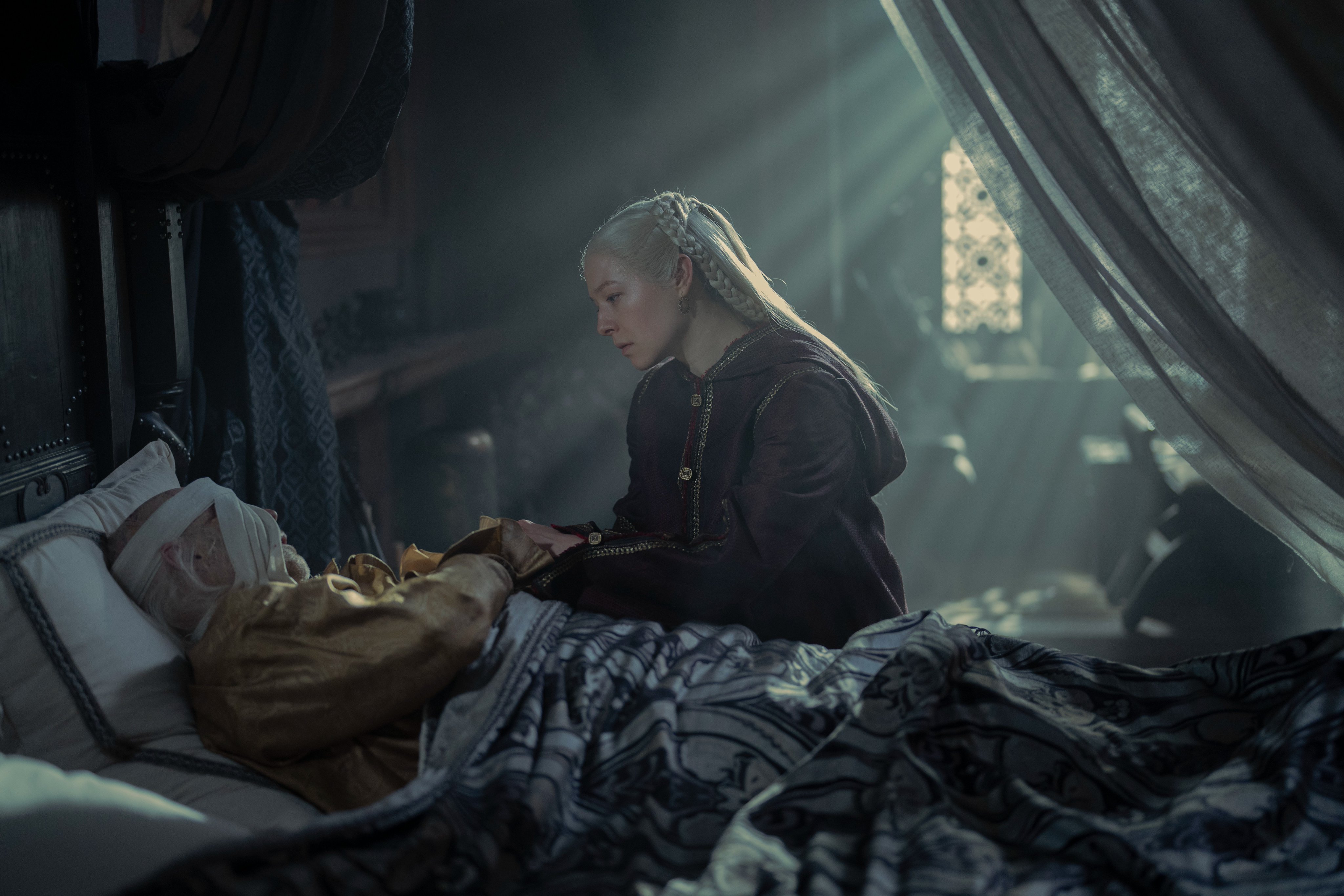
There’s a fascinating intimacy to “The Green Council.” Even in the episode’s final moments, as Rhaenys (Eve Best) brings her dragon to bear on the conspirators, the sequence contrasts the size of Meleys with the space in which she is trapped. The assembled citizenry who aren’t killed by Meleys’ arrival scramble desperately for safety, pushing up against the walls and dividers, as the guards struggle to keep the doors closed. Ironically, Otto ends the episode screaming, “Open the doors!”
“The Green Council” underscores the sense in which the fate of the Seven Kingdoms is about to be completely subsumed by what is effectively a family squabble. More than any episode to this point in the show, “The Green Council” demonstrates the folly of this power struggle. “It is our fate, I think, to crave always what is given to another,” Princess Helaena (Phia Saban) opines randomly, early in the episode. “If one possesses a thing, the other will take it away.” It is a zero-sum game.
Indeed, “The Green Council” returns time and again to the irony of all this plotting and scheming to place Aegon on the throne. Everybody involved knows that Aegon is not fit to rule. “Aegon is not fit to rule,” Ser Arryk warns his brother. Aemond describes his brother as “a wastrel who has never taken half an interest in his birthright.” Even Aegon himself, being dragged to his destiny, protests, “I’m not suited!” All this blood is being spilled in support of a monster who doesn’t want to be king.
Queen Alicent (Olivia Cooke) is motivated by misunderstanding. She misinterpreted the dying words of her husband, King Viserys (Paddy Considine), who muttered about “Aegon the Conqueror” and “the Prince That Was Promised.” This is fitting, given the ambiguity around that same prophecy in Game of Thrones, where fans are still arguing whether “The Prince That Was Promised” was Jon Snow (Kit Harington), Jon Snow and Daenerys (Emilia Clarke), or even Arya Stark (Maisie Williams).
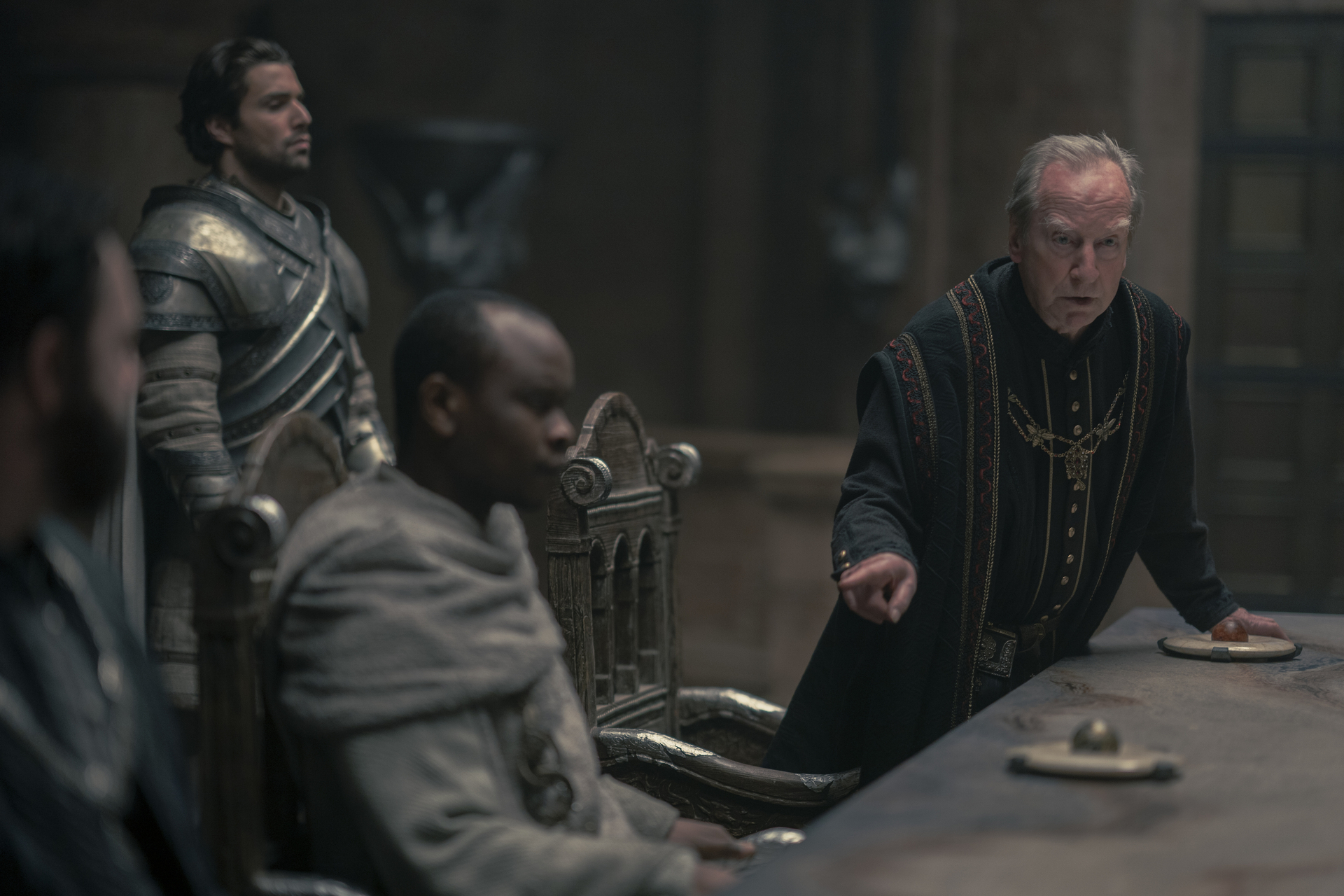
This misapprehension gives Alicent the moral standing to claim the throne for her son and so disinherit Rhaenyra. “He told me he wished for Aegon to be king,” she assures the Small Council. “It is the truth, out of his own lips, his last words to me, and I was the last one to hear it. And now he’s dead.” Game of Thrones was a show that deconstructed various fantasy tropes, and it’s good to see House of the Dragon doubling down on the idea that prophecy is often prone to self-serving distortion.
House of the Dragon is fascinated by patriarchal power structures. As co-showrunner Miguel Sapochnik has argued, the succession conflict has placed Alicent and her old friend Rhaenyra “on opposite ends of an ideological spectrum when it comes to the patriarchal structure they’re trapped in.” To be fair, House of the Dragon has been somewhat vague in Rhaenyra’s relationship to that structure beyond her desire for her own advancement, but “The Green Council” focuses on Alicent.
Alicent has spent decades subject to the casual misogyny of these power structures and has made compromises to further what she sees as the greater good, as well as perhaps to minimize the harm it inflicts on her and others. “We do not rule, but we may guide the men who do,” she urges Rhaenys, a statement that offers a succinct summary of her worldview. Alicent does not believe the system will ever allow women to hold power, so they must instead use other means of influence.
“The Green Council” understands the absurdity of Alicent’s position, as a woman essentially reinforcing the “Leopards Eating People’s Faces Party.” Alicent is nominally Queen of the Seven Kingdoms, but “The Quiet Council” repeatedly emphasizes that she is marginalized within the existing power structures. She is often just an instrument by which the men around her amass power. Her father conspires against her. Her son doesn’t want to rule.
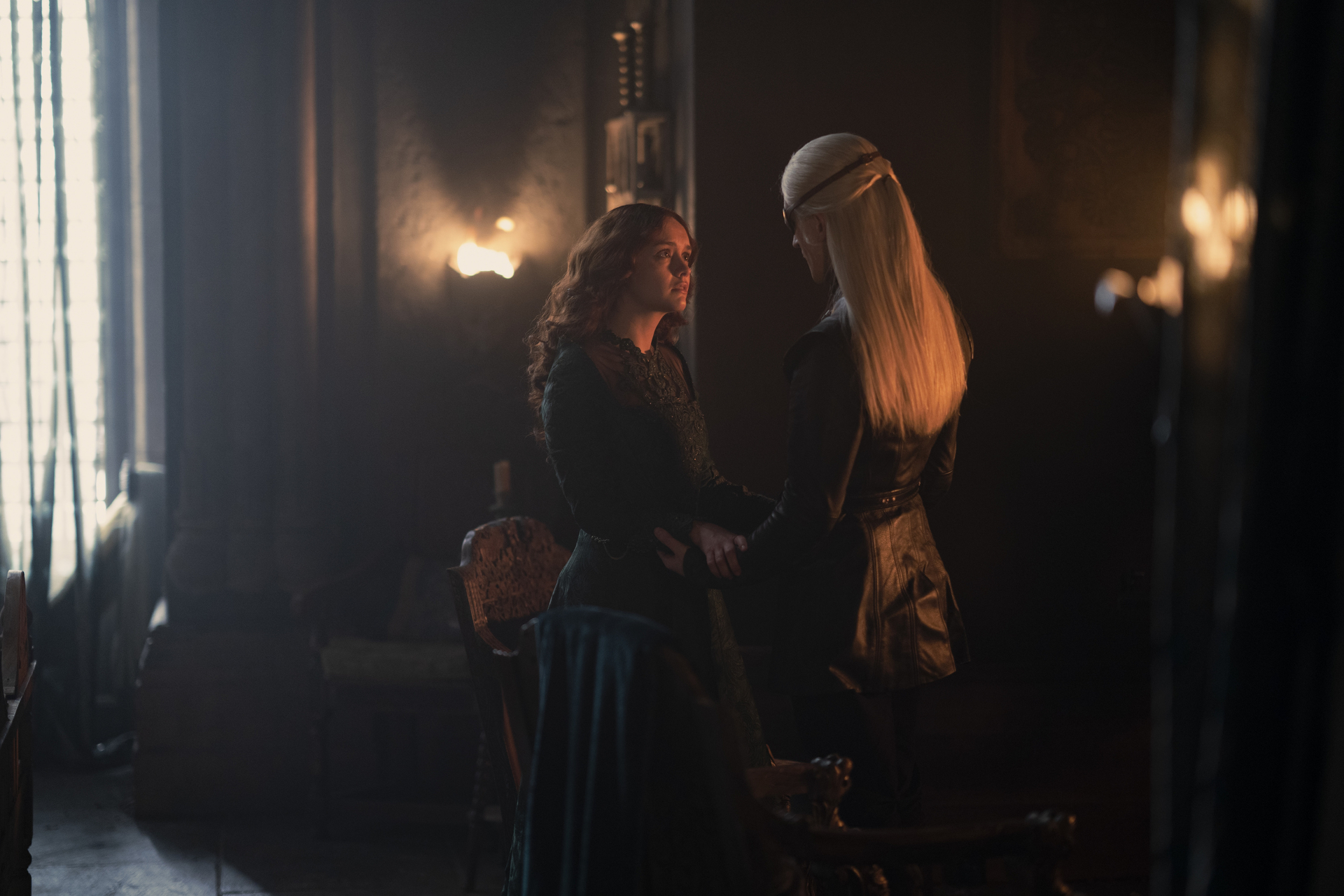
In one of the episode’s most direct and unsettling examples of how this system degrades and humiliates Alicent even as she works to reinforce it, she submits herself for Larys Strong (Matthew Needham), shamefully turning her head away as he masturbates to her unstockinged feet. Alicent is supposedly the most powerful woman in Westeros, but she is still an object that exists for the sexual gratification of a man of much lower social standing.
“The Green Council” contrasts Alicent with Rhaenys. In earlier episodes like “Driftmark,” Rhaenys seemed passive, resigned to be nothing more than “the Queen Who Never Was.” Her husband Corlys claimed to be offended on her behalf, even if Rhaenys argued that he was just feeding his own ambition. Rhaenys was content to counsel Rhaenyra to accept “the hard truth” back in “The Rogue Prince.” However, over the course of “The Green Council,” it seems that the fire within Rhaenys reignites — quite literally, as she takes to her dragon.
She chides Alicent for her passivity. “You toil still in service to men: your father, your husband, your son,” Rhaenys argues. “You desire not to be free, but to make a window in the wall of your prison. Have you never imagined yourself on the Iron Throne?” One of the big arguments over House of the Dragon is the sense that the show is heavily weighted in Rhaenyra’s favor, presenting her side as more progressive and easier to root for. It remains to be seen if “The Black Queen” can add shading.
However, there is a cynicism to “The Green Council.” After all, Rhaenys’ triumphant stand against the patriarchy likely resulted in the deaths of dozens of innocents. She is playing Princess Helaena’s zero-sum game. Do Rhaenyra and Rhaenys want to truly demolish patriarchal power structures, or do they wish to bend the same sort of tyranny to serve their interests? After all, Rhaenyra’s fight for independence in “King of the Narrow Sea” didn’t extend even as far as her best friend Alicent.
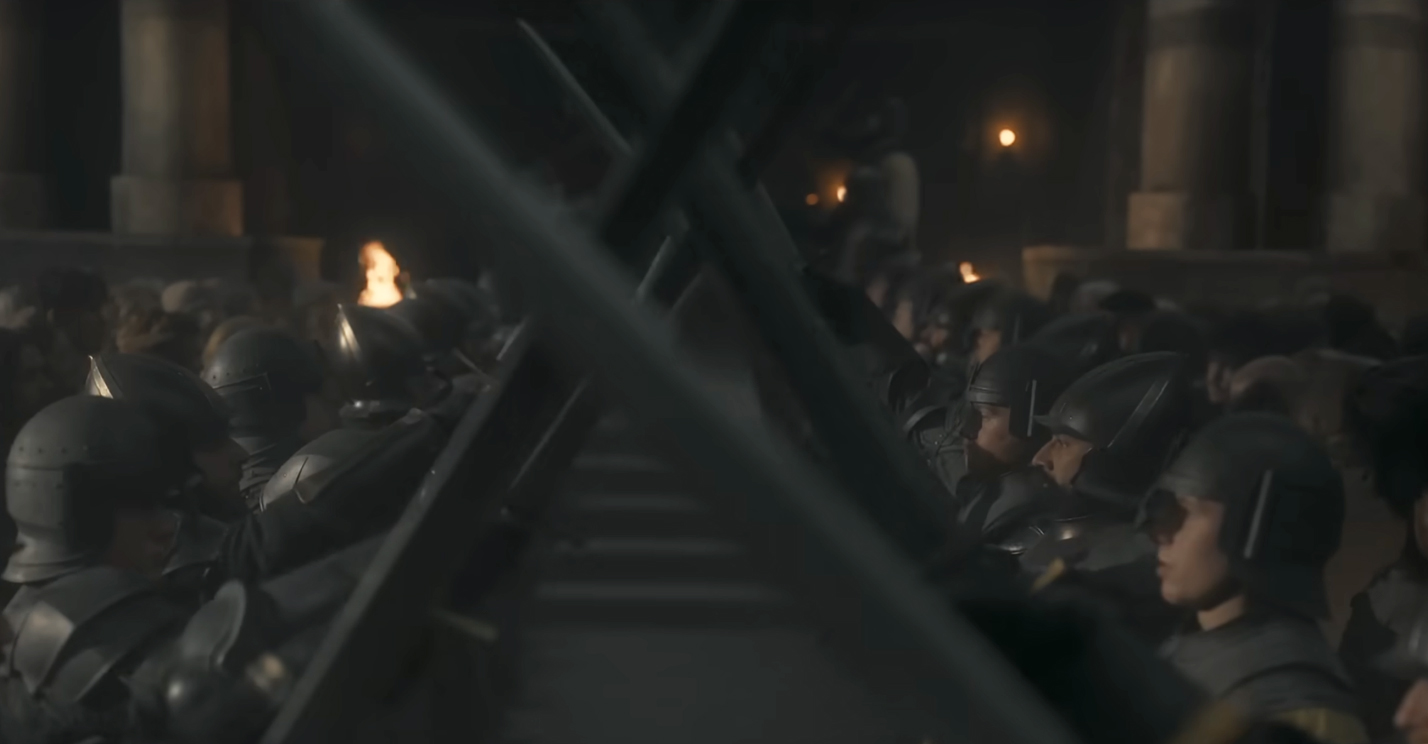
“The Green Council” acknowledges the cost of this struggle to those caught in its path. The episode includes showcases for two actors who have felt somewhat marginalized within the larger ensemble, overqualified performers cast in what appeared to be background roles. At the Small Council, Graham McTavish gets his meatiest scene as Ser Harrold Westerling, the Lord Commander of the King’s Guard. Westerling is a decent man, not a partisan. He recuses himself from the struggle.
The episode also gives material to Sonoya Mizuno as Mysaria, who was Daemon’s mistress earlier in the season and is now a madam in King’s Landing. While Westerling is smart (and cynical) enough to understand that no decent person will come out of this conflict ahead, Mysaria attempts to exploit the succession chaos for the greater good. She holds Aegon hostage, but not just for a ransom to line her pockets. She tries to blackmail Otto to make living conditions better in King’s Landing.
Touring Fleabottom, Ser Erryk and Ser Arryk are confronted with the local depravity, including the brutal exploitation of children for the amusement of eager crowds. “I want an end to the savage use of children in Fleabottom,” Mysaria warns Otto. “They’re forced to fight and worse.” It’s the most selfless decision that any character makes in “The Green Council.” Mysaria herself seems to come out ahead. “There is no power but what the people allow you to take,” she goads Otto.
It is a small moment of decency in an otherwise cynical episode, and it seems initially triumphant. It doesn’t last. Strong warns Alicent about the network of spies that Mysaria employs in the Red Keep, leading Alicent to encourage Strong to take action against Mysaria. Much like Strong arranged for the murder of his own father and brother, he has one of his agents take a torch to Mysaria’s brothel. Even if Mysaria survives, her organization is gone.
Strong’s use of fire is not incidental. In Westeros, fire is the instrument of state power. There is a clever ambiguity about whether the destruction of Mysaria’s base of operations was done in service of Otto or Alicent. Otto seems unlikely to have taken Mysaria’s threat comfortably, and Strong vowed that his “time with the Queen” could “benefit” Otto. Still, whatever the motivation, Mysaria stood up to the powerful and tried to make the world better, and the crown put her in her place.
With “The Green Council,” House of the Dragon captures the folly of this succession power grab, the emptiness of it for even those jockeying for position, and the high price paid by those crushed underfoot. For the first time, House of the Dragon seems truly cynical about this Game of Thrones.

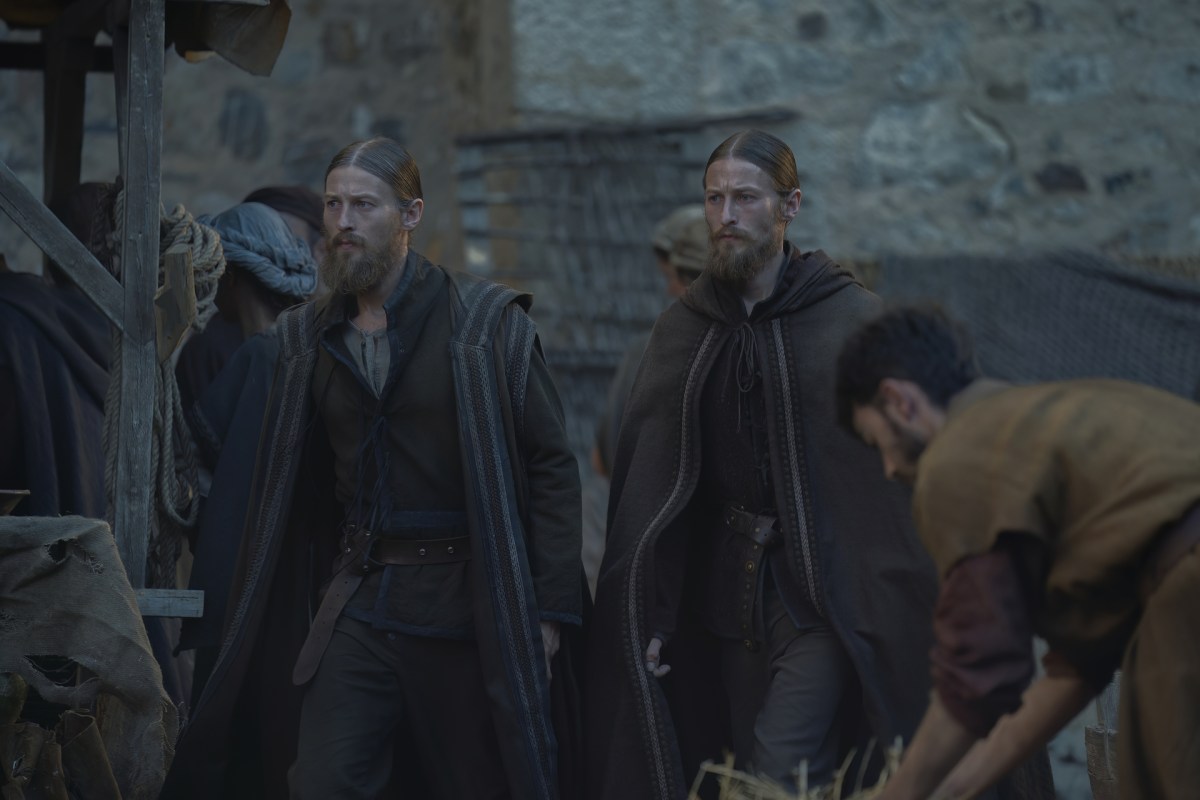




Published: Oct 16, 2022 10:00 pm